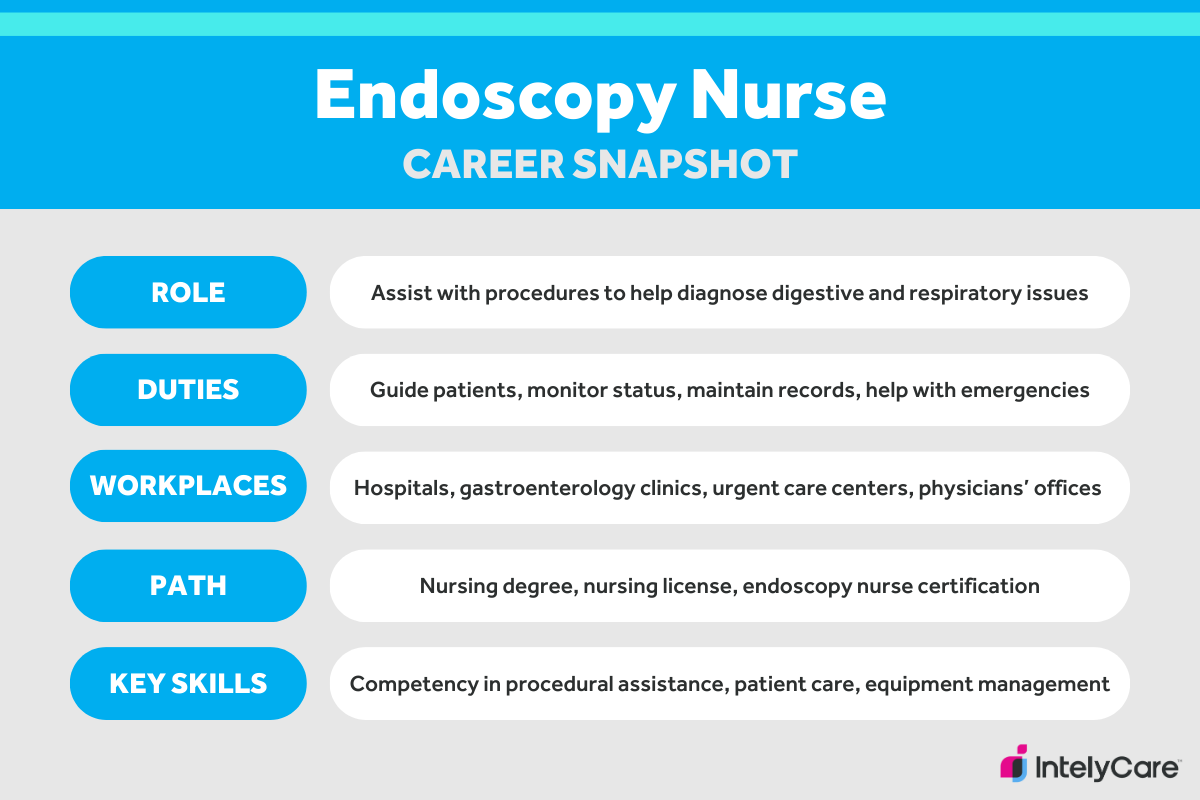

Digestive and respiratory diseases are widespread globally, causing suffering and death. In the U.S. alone, over 40 million people grapple with digestive issues, leading to millions of doctors’ visits each year. Also, over 34 million people in the U.S. have chronic lung diseases. All of these people need the expertise of an endoscopy nurse — and that could be you.
As the demand for endoscopy nursing professionals skyrockets, you might be wondering how to step into this field. We’ll answer your questions and provide you with a clear, step-by-step guide on how to enter this dynamic specialty.

Endoscopy nurses play a crucial role in the medical field, specializing in procedures that use a flexible tube with a camera — an endoscope — to examine the inside of the body. These procedures help diagnose and treat various conditions, from digestive issues to respiratory concerns.
These professionals can work in various healthcare settings where endoscopic procedures are performed. Your potential workplaces can include:
Expect dynamic and diverse days in this specialty. In addition to typical nursing tasks like head-to-toe assessments and medication administration, endoscopy nurse duties include:
Exact endoscopy nursing responsibilities differ greatly based on the practice you’re working in. Some medical offices focus on specific procedures, such as colonoscopies, while other workplaces cover a range of endoscopic tasks. Other types of endoscopies include:
Let’s explore the key steps to kickstart your journey into this specialized field of nursing.
Begin by obtaining a nursing degree from an accredited nursing program. This can be an associate degree in nursing (ADN) or a bachelor of science in nursing (BSN) degree. The fastest way to become a nurse involves getting an ADN degree and can be accomplished in as little as six months.
To become a registered nurse (RN), you need to obtain the necessary nursing licensure for your state. This typically involves passing the NCLEX-RN (National Council Licensure Examination for Registered Nurses).
Acquire hands-on experience as a registered nurse, preferably in a medical-surgical, surgical unit, or gastroenterology setting. This experience builds a strong foundation for transitioning into endoscopy nursing.
It can be beneficial to pursue certification in gastroenterology or endoscopy nursing. Although certification isn’t typically required, many employers prefer it for this role. Organizations like the American Board of Certification for Gastroenterology Nurses (ABCGN) offer certifications that can enhance your credentials.
Stay updated on advancements in endoscopy nursing by attending conferences, taking continuing education courses, and joining professional organizations. Continuous learning ensures you stay knowledgeable in this evolving field.
As an optional step, you can choose to pursue advanced education by obtaining a master of science in nursing (MSN) or a doctor of nursing practice (DNP) degree and becoming a nurse practitioner.
The average endoscopy nurse pay rate is around $68,650 per year. Your salary will vary based on your experience, education, certifications, and geographic location.
If you are open to relocation, consider submitting your nurse resume to one of these top-paying states:
Yes, endoscopy nursing can be stressful at times. The fast-paced environment and the need for precision during procedures contribute to the potential stress. However, it can be managed with experience, effective coping strategies, and a supportive work environment.
The most important competencies for this role include proficiency in procedural assistance, patient care during and after endoscopies, equipment management, effective communication, and the ability to address emergencies if needed.
The demand for registered nurses, including those working in the field of endoscopy, is expected to increase by 6% in the next decade, which is faster than the average for all jobs. Over 193,000 new openings for registered nurses are projected to open up each year.
During endoscopy procedures, various types of anesthesia can be used, depending on the nature of the procedure and the patient’s health. The two main types are conscious sedation and deep sedation. The patient’s care varies depending on the level of anesthesia administered.
The length of an endoscopy procedure ranges from 30 minutes to two hours, depending on the type of procedure. While most people can return home on the day of the endoscopy, there are cases where an overnight hospital stay is required.
Yes, this role comes with some challenges and risks. Emotionally, patient care can be intense. Additionally, risks can include exposure to infectious diseases, procedural complications, and occupational hazards. With good training, following safety protocols, and good communication, these challenges and risks can be managed.
Endoscopy nurses often find job satisfaction in the dynamic nature of their work. However, individual satisfaction varies, influenced by factors like workplace environment, team dynamics, and personal preferences.
Need help finding a new role? We specialize in helping you find the best-fitting nurse jobs. Connect with IntelyCare for nationwide job matches that align with your career goals.